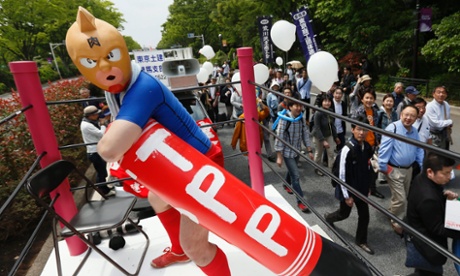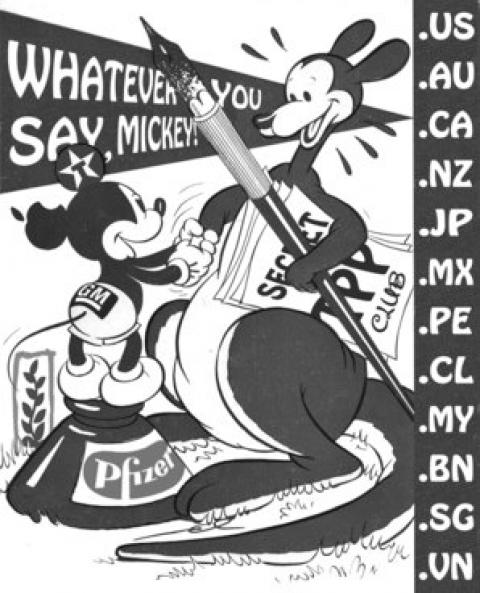- WikiLeaks Publishes Secret Draft Chapter of Trans-Pacific Partnership - Alex Hern and Dominic Rushe in The Guardian
- Secret Trans-Pacific Partnership Agreement (TPP) - WikiLeaks
WikiLeaks Publishes Secret Draft of Trans-Pacific Partnership
By Alex Hern and Dominic Rushe
November 13, 2013
The Guardian (UK)

Demonstrators protest against the Trans-Pacific Partnership (TPP) after the May Day rally in Tokyo, Japan.
credit - The Guardian / Photograph: EPA/Kimimasa Mayama
WikiLeaks has released the draft text of a chapter of the Trans-Pacific Partnership (TPP) agreement, a multilateral free-trade treaty currently being negotiated in secret by 12 Pacific Rim nations.
The full agreement covers a number of areas, but the chapter published by WikiLeaks focuses on intellectual property rights, an area of law which has effects in areas as diverse as pharmaceuticals and civil liberties.
Negotiations for the TPP have included representatives from the United States, Canada, Australia, New Zealand, Japan, Mexico, Malaysia, Chile, Singapore, Peru, Vietnam, and Brunei, but have been conducted behind closed doors. Even members of the US Congress were only allowed to view selected portions of the documents under supervision.
"We're really worried about a process which is so difficult for those who take an interest in these agreements to deal with. We rely on leaks like these to know what people are talking about," says Peter Bradwell, policy director of the London-based Open Rights Group.
"Lots of people in civil society have stressed that being more transparent, and talking about the text on the table, is crucial to give treaties like this any legitimacy. We shouldn't have to rely on leaks to start a debate about what's in then."
The 30,000 word intellectual property chapter contains proposals to increase the term of patents, including medical patents, beyond 20 years, and lower global standards for patentability. It also pushes for aggressive measures to prevent hackers breaking copyright protection, although that comes with some exceptions: protection can be broken in the course of "lawfully authorised activities carried out by government employees, agents, or contractors for the purpose of law enforcement, intelligence, essential security, or similar governmental purposes".
WikiLeaks claims that the text shows America attempting to enforce its highly restrictive vision of intellectual property on the world - and on itself. "The US administration is aggressively pushing the TPP through the US legislative process on the sly," says Julian Assange, the founder and editor-in-chief of WikiLeaks, who is living in the Ecuadorean embassy in London following an extradition dispute with Sweden, where he faces allegations of rape.
"If instituted," Assange continues, "the TPP's intellectual property regime would trample over individual rights and free expression, as well as ride roughshod over the intellectual and creative commons. If you read, write, publish, think, listen, dance, sing or invent; if you farm or consume food; if you're ill now or might one day be ill, the TPP has you in its crosshairs."
Just Foreign Policy, a group dedicated to reforming US foreign policy, managed to crowdfund a $70,000 (£43,700) bounty for Wikileaks if the organisation managed to leak the TPP text. "Our pledge, as individuals, is to donate this money to WikiLeaks should it leak the document we seek." The conditions the group set have not yet been met, however, because it required the full text, not individual chapters.
Related to the TPP is a second secret trade agreement, the Transatlantic Trade and Investment Partnership (TTIP), which ties together regulatory practices in the US and EU. George Monbiot, writing in this paper, referred to the treaty as a "monstrous assault on democracy". Ken Clarke, the minister without portfolio, replied that it "would see our economy grow by an extra £10bn per annum".
Campaign group Fight for the Future has already collected over 100,000 signatures in an online petition against what it calls the "extreme Internet censorship plan" contained in the TPP.
Evan Greer, campaign manager for Fight for the Future, said: "The documents revealed by WikiLeaks make it clear why the US government has worked so hard to keep the TPP negotiatons secret. While claiming to champion an open Internet, the Obama administration is quietly pushing for extreme, SOPA-like copyright policies that benefit Hollywood and giant pharmaceutical companies at the expense of our most basic rights to freedom of expression online."
Secret Trans-Pacific Partnership Agreement (TPP)
WikiLeaks
November 13, 2013
Today, 13 November 2013, WikiLeaks released the secret negotiated draft text for the entire TPP (Trans-Pacific Partnership) Intellectual Property Rights Chapter. The TPP is the largest-ever economic treaty, encompassing nations representing more than 40 per cent of the world's GDP. The WikiLeaks release of the text comes ahead of the decisive TPP Chief Negotiators summit in Salt Lake City, Utah, on 19-24 November 2013. The chapter published by WikiLeaks is perhaps the most controversial chapter of the TPP due to its wide-ranging effects on medicines, publishers, internet services, civil liberties and biological patents. Significantly, the released text includes the negotiation positions and disagreements between all 12 prospective member states.
The TPP is the forerunner to the equally secret US-EU pact TTIP (Transatlantic Trade and Investment Partnership), for which President Obama initiated US-EU negotiations in January 2013. Together, the TPP and TTIP will cover more than 60 per cent of global GDP. Both pacts exclude China.
Since the beginning of the TPP negotiations, the process of drafting and negotiating the treaty's chapters has been shrouded in an unprecedented level of secrecy. Access to drafts of the TPP chapters is shielded from the general public. Members of the US Congress are only able to view selected portions of treaty-related documents in highly restrictive conditions and under strict supervision. It has been previously revealed that only three individuals in each TPP nation have access to the full text of the agreement, while 600 'trade advisers' - lobbyists guarding the interests of large US corporations such as Chevron, Halliburton, Monsanto and Walmart - are granted privileged access to crucial sections of the treaty text.
The TPP negotiations are currently at a critical stage. The Obama administration is preparing to fast-track the TPP treaty in a manner that will prevent the US Congress from discussing or amending any parts of the treaty. Numerous TPP heads of state and senior government figures, including President Obama, have declared their intention to sign and ratify the TPP before the end of 2013.
WikiLeaks' Editor-in-Chief Julian Assange stated: "The US administration is aggressively pushing the TPP through the US legislative process on the sly." The advanced draft of the Intellectual Property Rights Chapter, published by WikiLeaks on 13 November 2013, provides the public with the fullest opportunity so far to familiarise themselves with the details and implications of the TPP.
The 95-page, 30,000-word IP Chapter lays out provisions for instituting a far-reaching, transnational legal and enforcement regime, modifying or replacing existing laws in TPP member states. The Chapter's subsections include agreements relating to patents (who may produce goods or drugs), copyright (who may transmit information), trademarks (who may describe information or goods as authentic) and industrial design.
The longest section of the Chapter - 'Enforcement' - is devoted to detailing new policing measures, with far-reaching implications for individual rights, civil liberties, publishers, internet service providers and internet privacy, as well as for the creative, intellectual, biological and environmental commons. Particular measures proposed include supranational litigation tribunals to which sovereign national courts are expected to defer, but which have no human rights safeguards. The TPP IP Chapter states that these courts can conduct hearings with secret evidence. The IP Chapter also replicates many of the surveillance and enforcement provisions from the shelved SOPA and ACTA treaties.
The consolidated text obtained by WikiLeaks after the 26-30 August 2013 TPP meeting in Brunei - unlike any other TPP-related documents previously released to the public - contains annotations detailing each country's positions on the issues under negotiation. Julian Assange emphasises that a "cringingly obsequious" Australia is the nation most likely to support the hardline position of US negotiators against other countries, while states including Vietnam, Chile and Malaysia are more likely to be in opposition. Numerous key Pacific Rim and nearby nations - including Argentina, Ecuador, Colombia, South Korea, Indonesia, the Philippines and, most significantly, Russia and China - have not been involved in the drafting of the treaty.
In the words of WikiLeaks' Editor-in-Chief Julian Assange, "If instituted, the TPP's IP regime would trample over individual rights and free expression, as well as ride roughshod over the intellectual and creative commons. If you read, write, publish, think, listen, dance, sing or invent; if you farm or consume food; if you're ill now or might one day be ill, the TPP has you in its crosshairs."
Current TPP negotiation member states are the United States, Japan, Mexico, Canada, Australia, Malaysia, Chile, Singapore, Peru, Vietnam, New Zealand and Brunei.
Read the full secret TPP treaty IP chapter here.


Spread the word